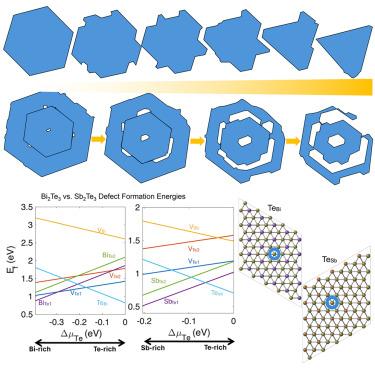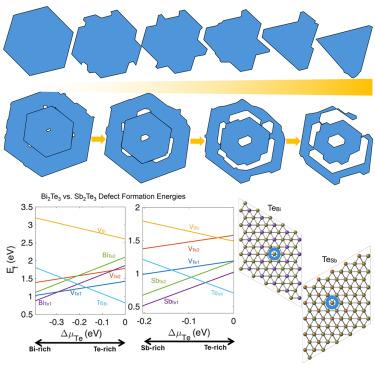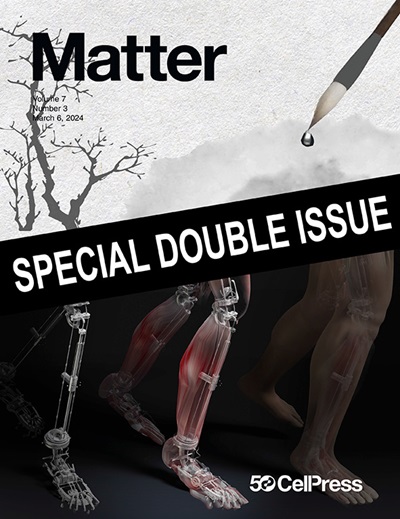Thermally induced structural evolution and nanoscale interfacial dynamics in Bi-Sb-Te layered nanostructures
IF 17.3
1区 材料科学
Q1 MATERIALS SCIENCE, MULTIDISCIPLINARY
引用次数: 0
Abstract
Layered chalcogenides, including Bi-Sb-Te ternary alloys and heterostructures, are renowned as thermoelectric and topological insulators and have recently been highlighted as plasmonic building blocks beyond noble metals. We conduct joint in situ transmission electron microscopy and density functional theory calculations to investigate the temperature-dependent nanoscale dynamics and interfacial properties, identifying the role of native defects and edge configurations in the anisotropic sublimation of Bi2Te3-Sb2Te3 heterostructures and Sb2-xBixTe3 alloys. We report structural dynamics, including edge evolution, layer-by-layer sublimation, and the formation and coalescence of thermally induced polygonal nanopores. These nanopores are initiated by preferential dissociation of tellurium, reducing thermal stability in heterostructures. Triangular and quasi-hexagonal configurations dominate nanopore structures in heterostructures. Our calculations reveal antisite defects (TeSb and TeBi) as key players in defect-assisted sublimation. These findings enhance our understanding of nanoscale dynamics and assist in designing tunable low-dimensional chalcogenides.


铋锑碲层状纳米结构中的热诱导结构演化和纳米级界面动力学
层状卤化物(包括铋锑碲三元合金和异质结构)是著名的热电和拓扑绝缘体,最近还被强调为贵金属之外的质子构件。我们联合进行了原位透射电子显微镜和密度泛函理论计算,以研究随温度变化的纳米尺度动力学和界面特性,确定了原生缺陷和边缘构型在 Bi2Te3-Sb2Te3 异质结构和 Sb2-xBixTe3 合金的各向异性升华中的作用。我们报告了结构动态,包括边缘演变、逐层升华以及热诱导多边形纳米孔的形成和凝聚。这些纳米孔由碲的优先解离引发,降低了异质结构的热稳定性。异质结构中的纳米孔结构以三角形和准六边形构型为主。我们的计算揭示了反卫星缺陷(TeSb 和 TeBi)在缺陷辅助升华中的关键作用。这些发现加深了我们对纳米尺度动力学的理解,有助于设计可调谐的低维铬化镓。
本文章由计算机程序翻译,如有差异,请以英文原文为准。
求助全文
约1分钟内获得全文
求助全文
来源期刊

Matter
MATERIALS SCIENCE, MULTIDISCIPLINARY-
CiteScore
26.30
自引率
2.60%
发文量
367
期刊介绍:
Matter, a monthly journal affiliated with Cell, spans the broad field of materials science from nano to macro levels,covering fundamentals to applications. Embracing groundbreaking technologies,it includes full-length research articles,reviews, perspectives,previews, opinions, personnel stories, and general editorial content.
Matter aims to be the primary resource for researchers in academia and industry, inspiring the next generation of materials scientists.
 求助内容:
求助内容: 应助结果提醒方式:
应助结果提醒方式:


